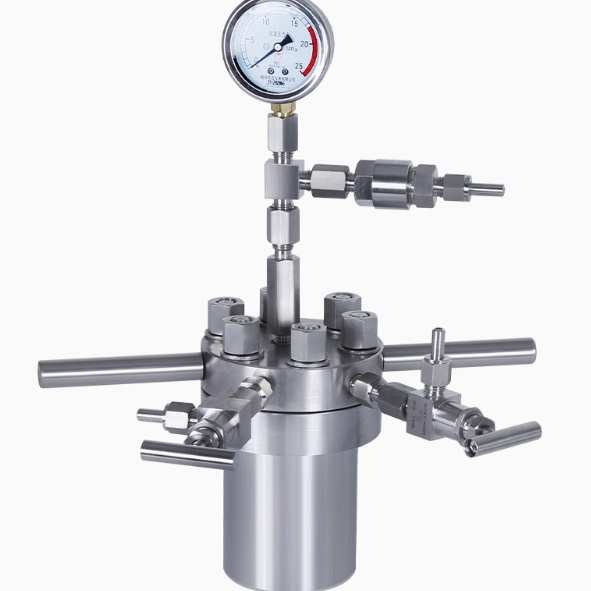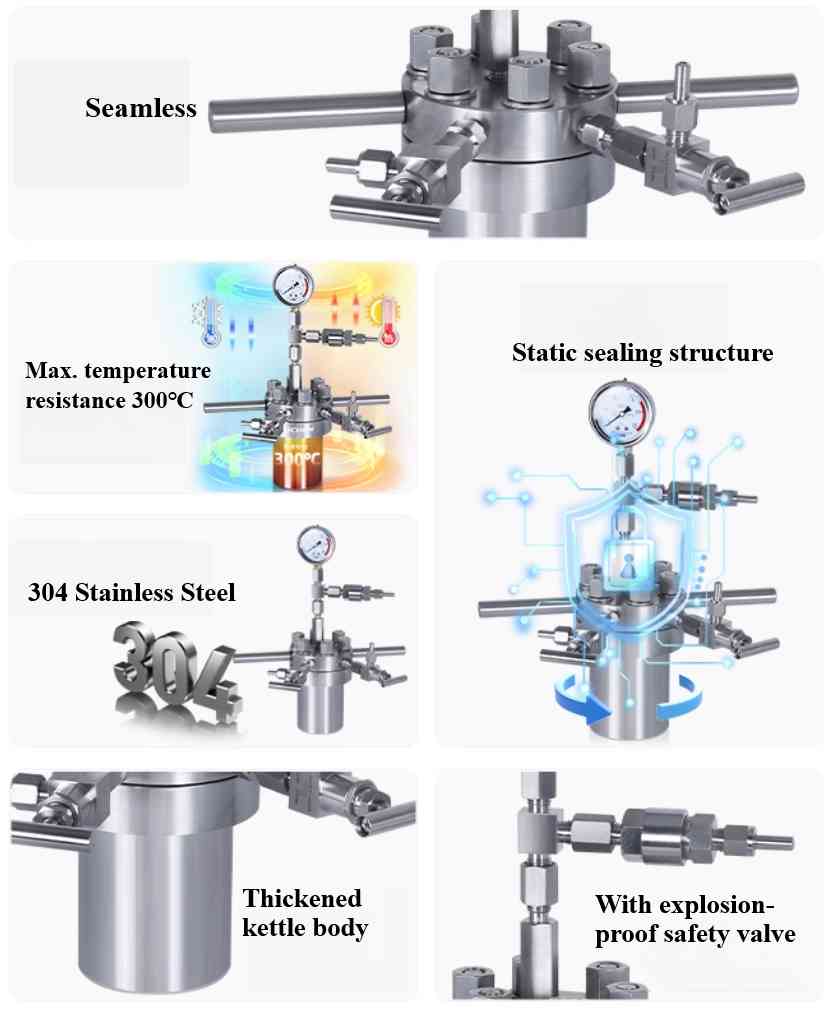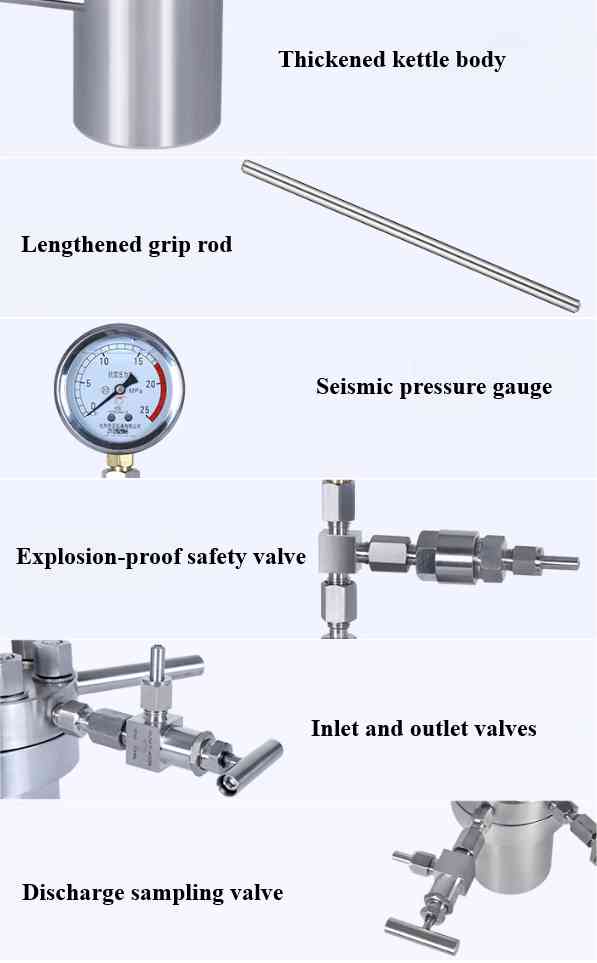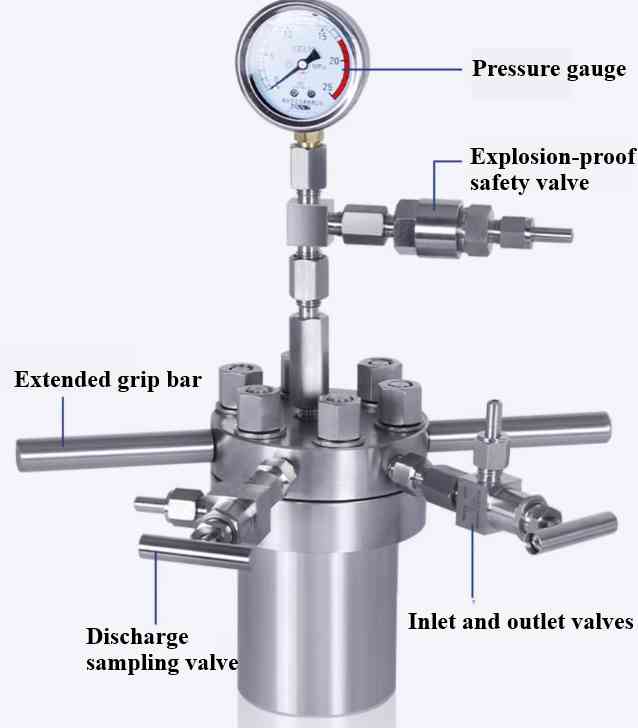
High Pressure Reactor
Customizable High Pressure Reactors for Advanced Scientific and Industrial Applications
Item Number : KR-2H
Price varies based on specs and customizations
- Reactor material
- 304/316L Stainless Steel
- Liner material
- PTFE/PPL
Shipping:
Contact us to get shipping details Enjoy On-time Dispatch Guarantee.
Why Choose Us
Easy ordering process, quality products, and dedicated support for your business success.
Introduction
This laboratory-scale high-pressure reactor is a high-performance autoclave engineered for precision and safety in demanding research and development environments. Constructed from high-quality stainless steel, it is designed to facilitate chemical reactions and material processing under significant temperature and pressure.
Applications
Our reactors are engineered for versatility and are widely used across a spectrum of professional fields, including:
- Materials Science: Synthesis of novel materials, nanomaterials, and composites.
- Chemical Synthesis: Catalytic reactions, hydrogenation, polymerization, and organic synthesis.
- Energy Development: Research into biofuels, hydrogen storage, and supercritical fluid extraction.
- Pharmaceuticals & Bioengineering: Drug development, biomass conversion, and sterilization processes.
- Petrochemicals: Studying reaction kinetics and catalyst performance.
Detail & Parts


Technical Specifications

| Parameter | 25 mL | 50 mL | 100 mL | 250 mL | 500 mL | 1000 mL | 2000 mL |
|---|---|---|---|---|---|---|---|
| Volume (mL) | 25 | 50 | 100 | 250 | 500 | 1000 | 2000 |
| Body Material | 304 | 304 | 304 | 304 | 304 | 304 | 304 |
| Body Diameter (mm) | 100 | 100 | 120 | 120 | 140 | 160 | 200 |
| Body Height (mm) | 70 | 70 | 100 | 130 | 165 | 245 | 280 |
| Inner Diameter (mm) | 30 | 40 | 44 | 58 | 70 | 80 | 105 |
| Inner Depth (mm) | 60 | 60 | 90 | 115 | 150 | 230 | 260 |
| Wall Thickness (mm) | 14 | 14 | 12 | 15 | 14 | 16 | 16.5 |
| Clamping Method | Bolt | Bolt | Bolt | Bolt | Bolt | Bolt | Bolt |
| Design Pressure (MPa) | 25 | 25 | 25 | 25 | 25 | 25 | 25 |
| Working Pressure (MPa) | 21.5 | 21.5 | 21.5 | 21.5 | 21.5 | 21.5 | 21.5 |
| Design Temp. (°C) | 350 | 350 | 350 | 350 | 350 | 350 | 350 |
| Working Temp. (°C) | 300 | 300 | 300 | 300 | 300 | 300 | 300 |
| Sealing Method | Static Seal | Static Seal | Static Seal | Static Seal | Static Seal | Static Seal | Static Seal |
| Pressure Gauge | Optional | Optional | Optional | Optional | Optional | Optional | Optional |
| Safety Device | Optional | Optional | Optional | Optional | Optional | Optional | Optional |
| Net Weight (kg) | 3.5 | 5.5 | 7.5 | 10 | 15 | 24 | 46 |
| Product Dimensions (mm) | 290x280x300 | 310x300x320 | 330x260x350 | 330x260x400 | 350x260x470 | 370x260x540 | 450x450x520 |
Key Advantages and Customer Value
Choosing this high-pressure reactor provides your laboratory with a powerful, reliable, and adaptable solution.
- Superior Durability: Built with robust 304 stainless steel, offering excellent corrosion resistance and mechanical strength for a long service life.
- High-Performance Capability: Engineered to consistently operate at high pressures (up to 21.5 MPa) and temperatures (up to 300°C), enabling experiments in extreme conditions.
- Reliable Sealing: Utilizes a proven static sealing method to guarantee a leak-free environment, protecting the integrity of your experiment and ensuring operator safety.
- Full Customization: We understand that no two experiments are the same. We offer full customization based on your specific requirements for volume, pressure, temperature, and material compatibility, from single prototypes to batch production.
- Operational Flexibility: The multi-port design allows for simultaneous monitoring, dosing, and sampling, streamlining complex experimental workflows.
By integrating our reactors into your workflow, you gain the confidence to explore challenging chemical frontiers, generate accurate and repeatable data, and accelerate your research and development cycles.
We are dedicated to being your partner in innovation. To create a reactor system perfectly aligned with your research objectives, we invite you to discuss your specific experimental needs with our technical team. Contact us today to start configuring your custom solution.
Warnings
Operator safety is the top important issue! Please operate the equipment with cautions. Working with inflammable& explosive or toxic gases is very dangerous, operators must take all necessary precautions before starting the equipment. Working with positive pressure inside the reactors or chambers is dangerous, operator must fellow the safety procedures strictly. Extra caution must also be taken when operating with air-reactive materials, especially under vacuum. A leak can draw air into the apparatus and cause a violent reaction to occur.
Designed for You
KinTek provide deep custom made service and equipment to worldwide customers, our specialized teamwork and rich experienced engineers are capable to undertake the custom tailoring hardware and software equipment requirements, and help our customer to build up the exclusive and personalized equipment and solution!
Would you please drop your ideas to us, our engineers are ready for you now!
Trusted by Industry Leaders

FAQ
What Is A High Pressure Reactor?
What Is An Autoclave Sterilizer?
What Causes An Increase In Pressure Within A High-pressure Reactor?
Increasing pressure inside a pressure reactor can be achieved through various means. One common method is by heating a sealed pressure vessel, where temperature and pressure increase proportionately, impacting reaction kinetics. Alternatively, the reaction occurring inside the vessel can induce pressure, and agitation can accelerate this process.
In situations where heating is unsuitable or insufficient pressure is generated, manual pressurization is possible with a compressed gas source, such as a compressor or a pre-compressed canister of inert gas.
Pressure reactors utilize pressure relief valves to safely regulate and maintain pressure, emphasizing their reliable and safe operation.
How Does An Autoclave Sterilizer Work?
How Does A Pressure Reactor Work?
What Are The Advantages Of Using Autoclave Sterilizers?
What Safety Precautions Should Be Taken When Using Autoclave Sterilizers?
Can All Materials And Items Be Sterilized Using Autoclave Sterilizers?
Are There Different Types Of Autoclave Sterilizers Available?
4.8 / 5
The hydrothermal synthesis reactor arrived promptly, well-packaged to prevent damage during shipping.
4.9 / 5
For the price, this reactor offers incredible value. It's sturdy and well-made, and it performs as advertised.
4.7 / 5
The reactor's construction is top-notch, with high-quality materials and meticulous attention to detail.
4.8 / 5
This reactor has proven to be extremely durable, withstanding the rigors of our lab environment with ease.
4.9 / 5
The reactor incorporates cutting-edge technology, making our research more efficient and accurate.
4.7 / 5
The reactor's safety features give us peace of mind, knowing that we can conduct experiments with confidence.
4.8 / 5
The reactor's compact design saves valuable bench space in our crowded lab.
4.9 / 5
The reactor's ease of use has significantly streamlined our workflow.
4.7 / 5
The reactor's versatility has allowed us to conduct a wide range of experiments with great success.
4.8 / 5
The reactor's reliability has ensured consistent and reproducible results in our research.
4.9 / 5
The reactor's exceptional performance has exceeded our expectations.
4.7 / 5
The reactor's user-friendly design makes it accessible to researchers of all experience levels.
4.8 / 5
The reactor's comprehensive documentation provides clear instructions and troubleshooting tips.
REQUEST A QUOTE
Our professional team will reply to you within one business day. Please feel free to contact us!
Related Products

High Pressure Laboratory Autoclave Reactor for Hydrothermal Synthesis
Discover the applications of Hydrothermal Synthesis Reactor - a small, corrosion-resistant reactor for chemical labs. Achieve rapid digestion of insoluble substances in a safe and reliable way. Learn more now.

Mini SS High Pressure Autoclave Reactor for Laboratory Use
Mini SS High Pressure Reactor - Ideal for medicine, chemical, and scientific research industries. Programmed heating temp and stirring speed, up to 22Mpa pressure.

Stainless High Pressure Autoclave Reactor Laboratory Pressure Reactor
Discover the versatility of Stainless High Pressure Reactor - a safe and reliable solution for direct and indirect heating. Built with stainless steel, it can withstand high temperatures and pressures. Learn more now.

Laboratory High Pressure Steam Sterilizer Vertical Autoclave for Lab Department
Vertical pressure steam sterilizer is a kind of sterilization equipment with automatic control, which is composed of heating system, microcomputer control system and overheating and overpressure protection system.

Laboratory High Pressure Horizontal Autoclave Steam Sterilizer for Lab Use
The horizontal autoclave steam sterilizer adopts the gravity displacement method to remove the cold air in the inner chamber, so that the inner steam and cold air content is less, and the sterilization is more reliable.

Desktop Fast High Pressure Laboratory Autoclave Sterilizer 16L 24L for Lab Use
The desktop fast steam sterilizer is a compact and reliable device used for rapid sterilization of medical, pharmaceutical, and research items.

Portable High Pressure Laboratory Autoclave Steam Sterilizer for Lab Use
Portable autoclave sterilization pressure is a device that uses pressure saturated steam to quickly and effectively sterilize items.

Anti-Cracking Press Mold for Lab Use
The anti-cracking press mold is a specialized equipment designed for molding various shapes and sizes of film using high pressure and electric heating.

Warm Isostatic Press WIP Workstation 300Mpa for High Pressure Applications
Discover Warm Isostatic Pressing (WIP) - A cutting-edge technology that enables uniform pressure to shape and press powdered products at a precise temperature. Ideal for complex parts and components in manufacturing.

Laboratory High Pressure Vacuum Tube Furnace
KT-PTF High Pressure Tube Furnace: Compact split tube furnace with strong positive pressure resistance. Working temp up to 1100°C and pressure up to 15Mpa. Also works under controller atmosphere or high vacuum.

Laboratory Sterilizer Lab Autoclave Herbal Powder Sterilization Machine for Plant
The herbal powder sterilization autoclave machine for Chinese medicine uses saturated steam for effective sterilization. It utilizes the heat and penetrative properties of steam, achieves sterilization after heat preservation, and maintains a good drying effect with a dedicated drying system.

Laboratory Sterilizer Lab Autoclave Pulse Vacuum Lifting Sterilizer
The pulse vacuum lifting sterilizer is a state-of-the-art equipment for efficient and precise sterilization. It uses pulsating vacuum technology, customizable cycles, and a user-friendly design for easy operation and safety.

Laboratory Sterilizer Lab Autoclave Pulsating Vacuum Desktop Steam Sterilizer
The pulsating vacuum desktop steam sterilizer is a compact and reliable device used for rapid sterilization of medical, pharmaceutical, and research items.

Desktop Fast Laboratory Autoclave Sterilizer 20L 24L for Lab Use
The desktop fast steam sterilizer is a compact and reliable device used for rapid sterilization of medical, pharmaceutical, and research items.

Desktop Fast Laboratory Autoclave Sterilizer 35L 50L 90L for Lab Use
The desktop fast steam sterilizer is a compact and reliable device used for rapid sterilization of medical, pharmaceutical, and research items. It efficiently sterilizes surgical instruments, glassware, medicines, and resistant materials, making it suitable for various applications.

Laboratory Sterilizer Lab Autoclave Vertical Pressure Steam Sterilizer for Liquid Crystal Display Automatic Type
Liquid crystal display automatic vertical sterilizer is a safe, reliable and automatic control sterilization equipment, which is composed of heating system, microcomputer control system and overheating and overvoltage protection system.

Portable Digital Display Automatic Laboratory Sterilizer Lab Autoclave for Sterilization Pressure
Portable autoclave sterilization pressure is a device that uses pressure saturated steam to quickly and effectively sterilize items.

Laboratory Horizontal Autoclave Steam Sterilizer Lab Microcomputer Sterilizer
The horizontal autoclave steam sterilizer adopts the method of gravity displacement to remove the cold air in the inner chamber, so that the content of steam cold air in the inner chamber is less, and the sterilization is more reliable.

Custom PTFE Teflon Parts Manufacturer for Hydrothermal Synthesis Reactor Polytetrafluoroethylene Carbon Paper and Carbon Cloth Nano-growth
Acid and alkali resistant polytetrafluoroethylene experimental fixtures meet different requirements. The material is made of brand new polytetrafluoroethylene material, which has excellent chemical stability, corrosion resistance, airtightness, high lubricity and non-stickiness, electrical corrosion and good anti-aging ability, and can work for a long time at temperatures from -180℃ to +250℃.
Related Articles

Enhancing Safety in Your Laboratory: A Comprehensive Guide to Pressure Reactor Safety
Laboratory safety isn't just about you. Improper preparation and mishandling can cause potential hazards that could be disastrous if left unchecked. It is crucial to take the time to carefully prepare your pressure reactor and lab safety equipment, as even minor problems can escalate quickly when working under pressure.

10 Essential Safety Steps for Pressure Reactor Use in Laboratories
Safety is paramount when conducting chemical reactions under pressurized conditions. It is important to carefully prepare pressure reactors and laboratory safety equipment to prevent potential hazards that, if not controlled, can have catastrophic consequences. In order to ensure the safety of using a pressure reactor, it is important to understand the specifications of the reactor. Become familiar with the chemistry of the reactor material and make sure it is chemically resistant enough to withstand the substances used in the reaction.

Comprehensive Guide to Rotating Disk Electrode (RDE) in Electrochemical Studies
Explore the detailed workings, applications, and significance of Rotating Disk Electrodes (RDE) in electrochemical research. Discover how RDEs are used in fuel cells, catalyst development, and more.

Hydrogen Atmosphere Furnaces: Applications, Safety, and Maintenance
Explore the comprehensive guide on hydrogen atmosphere furnaces, including their applications in high-end alloy sintering, safety measures, and maintenance tips. Learn about the types, components, and operational considerations for optimal performance.

Biomass Pyrolysis An Effective Means of Producing Biofuels
Biomass pyrolysis is a process that involves heating organic matter in the absence of oxygen to break it down into smaller molecules. This technology has gained popularity due to its potential to produce biofuels.

Advantages of the Rotating Electrode Method
Rotating electrode method involves rotating a small working electrode to increase the mass transport of reactants and products, allowing for more precise measurements and better control of reaction conditions.

Revolutionize Your Spectroscopy Analysis with FTIR Pellet Press
FTIR (Fourier Transform Infrared) spectroscopy is a widely used technique to analyze the chemical composition of various materials. This method is particularly useful for samples that are difficult to analyze using other techniques.

How FTIR Pellet Press Works in Sample Preparation for Spectroscopy Analysis
FTIR (Fourier Transform Infrared) spectroscopy is a powerful analytical technique for identifying and characterizing chemical compounds based on their infrared absorption spectra.

Laboratory Safety: High Pressure Equipment and Reactors
This article discusses safety measures and precautions for using high pressure equipment and reactors in laboratories, including case studies and detailed usage instructions.

Basic Laboratory Reaction Equipment
Overview of essential lab equipment for chemical reactions under various conditions.

Laboratory Jacketed Vessels
Overview of jacketed vessels, their types, and applications in various industries.

Commonly Used Organic Experimental Reaction Devices
Overview of various devices used in organic experiments to facilitate reactions and improve yields.